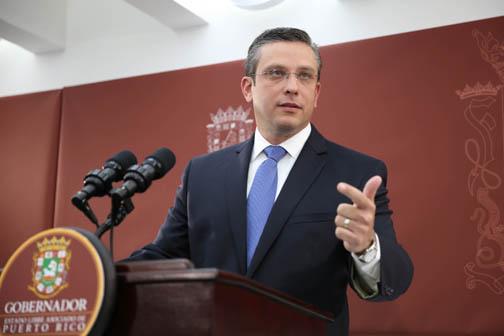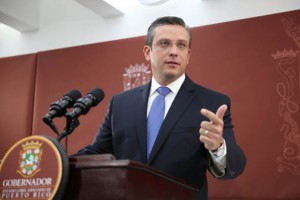Gov. García-Padilla unveils measures to address S&P cut


“This decision by S&P isn’t fair. We have addressed every issue they have brought up. Every time we did something they requested, they moved the line further back,” García-Padilla said during a news conference Tuesday.
In the wake of this week’s decision by Standard & Poor’s to cut Puerto Rico’s credit rating to junk, Gov. Alejandro García-Padilla unveiled Wednesday measures to cut the budget deficit, strengthen the Government Development Bank’s liquidity, and encourage economic growth.
In a bill submitted to the Legislature, E-14-0093, the executive branch included several proposals, namely amending the current budget to reduce the deficit by $170 million without laying off public employees, but requiring 2 percent expense cuts by central government agencies, except the Education Department.
This implies the renegotiation of rates for services and contracts, and reducing contingencies and special allocations made in the current budget that have not been paid. This is coupled with the efforts already implemented to reduce spending, including public payroll.
The legislation seeks to amend Articles 3 and 8 of Law 45-2013 to modify, among other things, financing the deficit of $245 million, so it is reduced to $75 million. To achieve this, the allocation provided in the budget for the Center for Municipal Revenue Collection (CRIM) must be adjusted. In its preamble, the measure provides that the funds received by municipalities through CRIM not be affected because they will be covered by the General Fund.
Meanwhile, the economic and fiscal team is negotiating loans whose payments have been accelerated by S&P’s action — $575 million in 90 days and $375 million in less than six months — and continues to work on financing alternatives to provide greater liquidity to the GDB.
“Puerto Rico has a plan to strengthen our economy. We have been implementing that plan since I became governor in January 2013 and efforts continue today,” García-Padilla siad. “This government must keep working within its capacity and continue to reduce the deficit; both necessary steps that will help us achieve our goals.”
On the revenue side, the administration is completing the revised projections without new taxes for the next fiscal year, taking into account the economic growth projection and income measures already legislated, together with the efforts to control tax evasion.
The governor also instructed agencies to accelerate infrastructure investment plans to revive the economy. In that vein, the government has identified $800 million in public and private investment in infrastructure projects that it will push aggressively.
The government will emphasize the development of Public-Private Partnership projects for new infrastructure, he said.
“All this while continuing to consolidate and diversify our industrial base,” García-Padilla noted.





